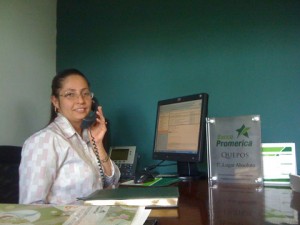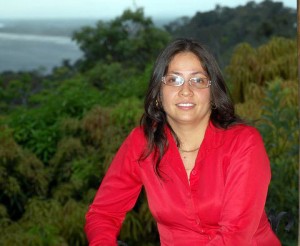Gina Jimenez Artavia
 (en Español)
(en Español)
By Carol Vlassoff
Imagine that you are 26 years old, female, recently promoted to the job of Operations Manager at Banco Promérica in Manuel Antonio. You are about to have your first meeting with other bank executives in San José. You’ve arrived from Quepos early that morning and you walk into the room carrying your agenda and a pen. There you confront a group of officials, mostly middle-aged men with laptops slung over their shoulders, talking on cell phones. That was Gina Jimenez’s introduction to her professional peers in 2005.
Gina admits that she felt a little intimidated. But when a question was posed by the moderator, she looked around and realized that no one else was going to answer. Gina put up her hand and gave the right response. That, she says, taught her an important lesson – what you know will take you a lot further than what you own. She said to herself, “I may not have a computer, but, hey, I know the answer!”
Gina grew up with seven siblings on her father’s farm in Purescal. She fondly remembers her childhood in a rural environment where her main concern was getting up to go to school in the mornings. Gina says that even as a small child she liked commerce, especially helping her father grow and market his products such as bananas, apples and guavas. When she finished high school, she moved to San José where she worked full time and studied at night. “Hard times,” she comments.
 Gina says that one of her biggest dreams was to travel, and at the age of 19, she found herself living in Nanaimo, Canada, with a young couple and their children. “The idea was that I would teach them Spanish and they would teach me English. But it didn’t work out that way,” she smiles. “After six months in Nanaimo they hadn’t learned Spanish and I hadn’t learned English.” She renewed her visa for another six months, but knew she would have to make a change if she was to meet her goal. She found out about a cultural centre that taught English and helped newcomers to the area. There she met other Latin Americans and was introduced to many aspects of Canadian life, including museums, restaurants and malls. “I really learned a lot,” she says. “It was a great experience that made me grow as a person and see things from other points of view.” In order to renew her visa a second time, she had to return to Costa Rica. “I came back with the firm intention of returning to Canada,” she says.
Gina says that one of her biggest dreams was to travel, and at the age of 19, she found herself living in Nanaimo, Canada, with a young couple and their children. “The idea was that I would teach them Spanish and they would teach me English. But it didn’t work out that way,” she smiles. “After six months in Nanaimo they hadn’t learned Spanish and I hadn’t learned English.” She renewed her visa for another six months, but knew she would have to make a change if she was to meet her goal. She found out about a cultural centre that taught English and helped newcomers to the area. There she met other Latin Americans and was introduced to many aspects of Canadian life, including museums, restaurants and malls. “I really learned a lot,” she says. “It was a great experience that made me grow as a person and see things from other points of view.” In order to renew her visa a second time, she had to return to Costa Rica. “I came back with the firm intention of returning to Canada,” she says.
Life took a different turn for her, however. Back in Purescal, her father had a stroke, and Gina realized that going to Nanaimo would make it too difficult to return to Costa Rica quickly if his health worsened. There was another reason as well. In Quepos, where she found a job with Bluefin Sportfishing, she met her future husband, Luis Aguilar, and married him.
Gina stayed with Bluefin for four and a half years working and studying part-time. “They (from Bluefin) opened the door for me,” she says. Through them she met many people and improved her English. She met people who invited her to visit them in Texas, where she spent two weeks seeing different places – San Antonio, the Alamo, Austin. She marvels at the huge servings of food in Texas. “I gained four kilos!” she recalls. She also visited the Panama Canal and other places in Panama. All this time she took business classes and received her B.A. from the University of Florencia del Castillo in Cartago.
In 2004, she joined the Banco Promérica as a teller. It gave her a chance to practice what she had studied, but she confides that what attracted her most were the uniforms. “I thought they were so elegant!” she says. Gina moved from teller to Operations Manager in 2005 and in 2006, she was promoted to Bank Manager. “I didn’t expect it, and when they called to offer me the job I was really overwhelmed by the confidence that they placed in me,” she says. “My job gives me an opportunity to grow. It is very satisfying.”
Gina faced many challenges as a young woman in such a responsible position. But she focuses on the positive aspects of her work, including the support of her colleagues and the many people she meets. What has served her well, she says, is her ability to speak English, something that distinguishes her from other Promérica branch managers who sometimes call her to help them with English-speaking clients. Every year of the branches of the Bank have a target for the number of “Marchamo” payments they obtain during the period of December to mid-January. In 2010 the Quepos-Manuel Antonio branch won first prize out of the 14 branches, and in 2011 it was the only branch to reach its target. Gina also feels satisfied with the growth in Bank’s portfolio and clientele over the years since she has been Manager. She smiles and says, “In a certain way I find myself doing the same thing I did as a child, only with different products and clients.”
Gina feels that foreigners have benefitted the Manuel Antonio area through tourism and investments. Nonetheless, she says, many people object to what they perceive as unnecessary bureaucracy and questioning on the part of the bank. Trying not to offend them, while adhering to the legal requirements of Costa Rica’s fiscal system, can be a challenge, she notes.
Two years ago, Gina and Luis had their first child, Fabricio. “I am blessed to be a mother,” Gina says. “ It’s a 360 degree change in my life, but it’s worth it. A little person who waits for my return from work, who depends on his Dad and Mom, and seeing him grow in every way, day by day, is a gift from God.” She says she has often wished for a manual on how to raise a child and keep up with “this little box of surprises”. But she says she has learned along with he and his Dad. “I think I’ll be better with my second child,” Gina smiles.
Gina says that she is thankful to her parents for teaching her to believe in herself, and for always moving forward, regardless of difficulties. She says her parents had little education: in fact, her mother never attended school and her father had only three years’ education. Yet both of them believed strongly in schooling for their children, despite the many obstacles they faced. Now, although partly paralyzed, her father continues to work, planting rice, potatoes and beans. “I learned from him that you have to struggle to achieve your goals. Everyone has capacity and everything is possible with effort and dedication.”
